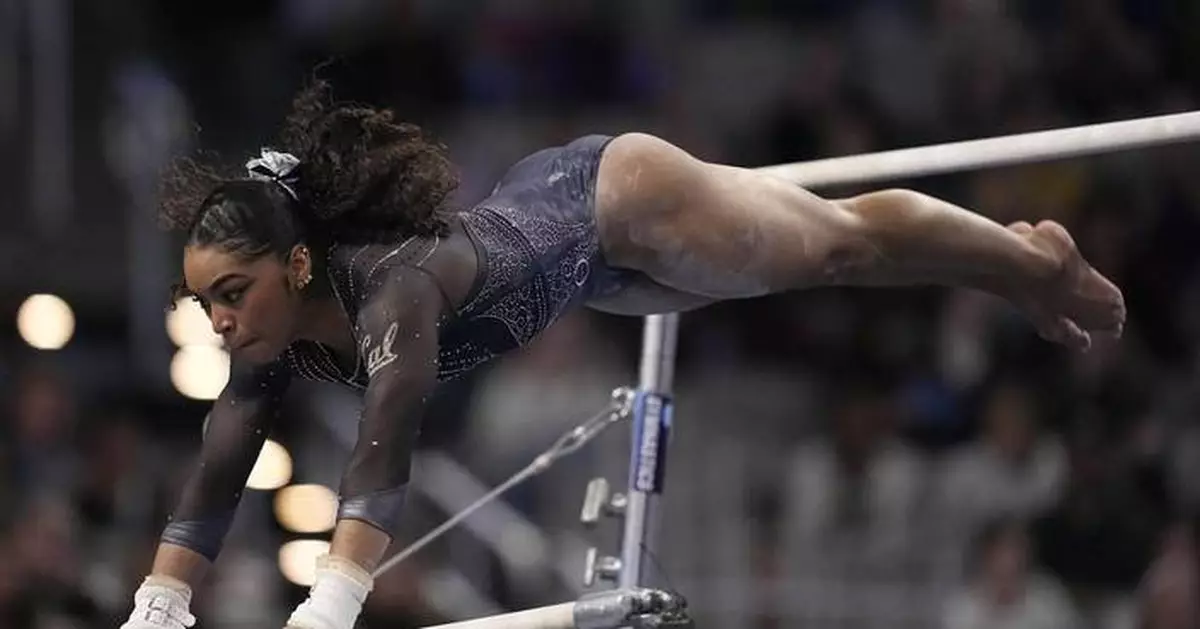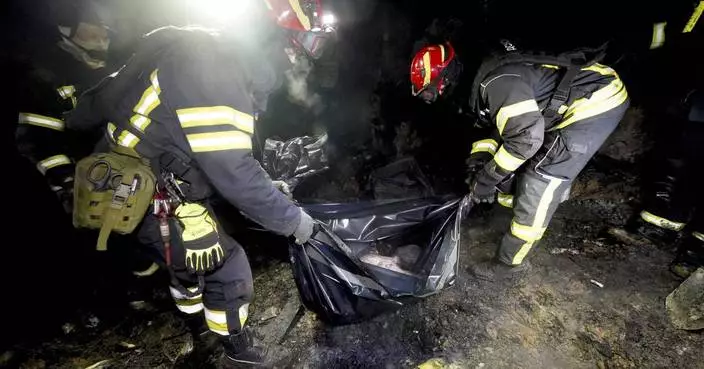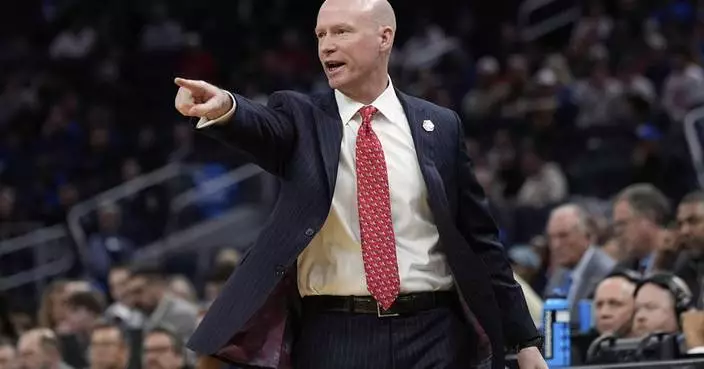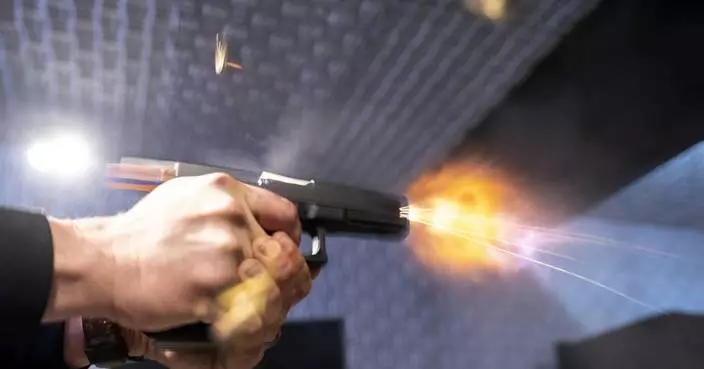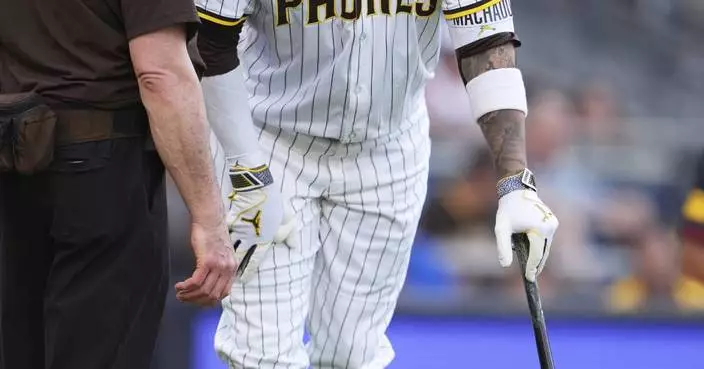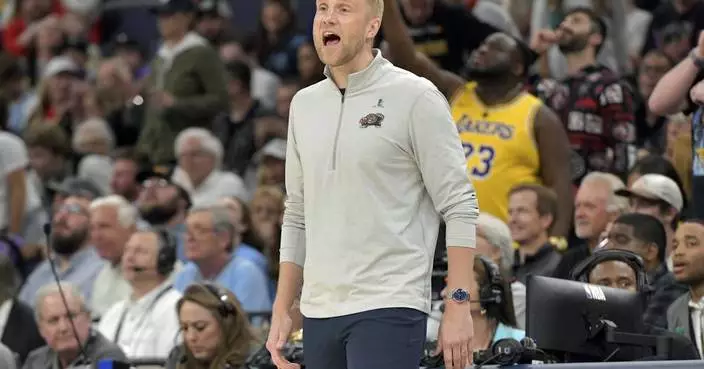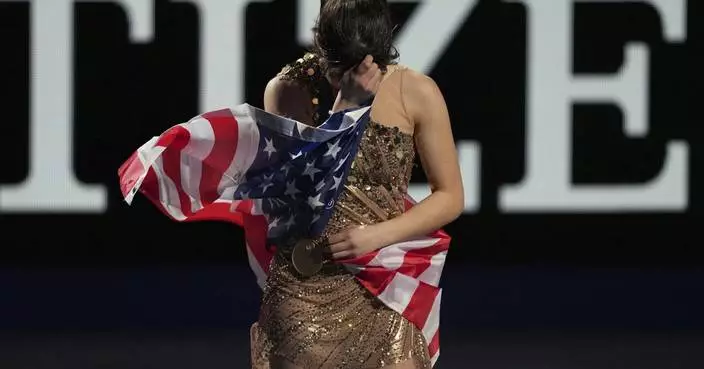FORT WORTH, Texas (AP) — Konnor McClain scored a 9.9625 on the beam — one of five LSU gymnasts with a score of at least 9.95 in the final rotation — to help the Tigers win the first NCAA title in program history on Saturday.
LSU, which finished fourth last year, trailed Utah by 0.037 points and led third-place California by 0.113 after three rotations but senior Sierra Ballard kicked off the fourth and final rotation with a career-high 9.950 — her only routine of the day. Savannah Schoenherr followed with a 9.3875 before McClain posted the best score of the day on the beam. Kiya Johnson, Haleigh Bryant and Aleah Finnegan each scored 9.950 to help the Tigers to a program record on the beam with a with a 49.7625 and seal LSU's national championship with a total score of 198.2250.
Cal, which made its first appearance in the finals, finished second with 197.8500, 0.0500 ahead of third-place Utah. Florida, which was expected to have a rebuilding year without stars Trinity Thomas (graduation) and Kayla DiCello (training for the upcoming Paris Olympics), finished in fourth place. was fourth with 197.4375.
Bryant, who won the individual all-around title on Thursday with a score of 39.7125, and Cal's eMjae Frazier matched that total on Saturday to tie for best individual score in the team finals.
Bryant posting a team-leading 9.9375 on the floor as LSU finished with 49.6125 to take the lead after Rotation 1. The Golden Bears were 0.1375 behind, led by Frazier's 9.9500 on the beam.
Amelie Morgan, Maile O’Keefe and Grace McCallum scored at least a 9.9 on beam for Utah in Rotation 2 to move in front of Cal with 98.9125, 0.100 behind LSU.
All six Utah gymnasts scored a 9.9-plus on the floor, with Abby Paulson, Maile O'Keefe and Jaylene Gilstrap each recording a 9.925 in Rotation 3, helping the Red Rocks move past LSU into first place with 148.500, 0.037 ahead of the Tigers.
AP Olympics coverage: https://apnews.com/hub/2024-paris-olympic-games
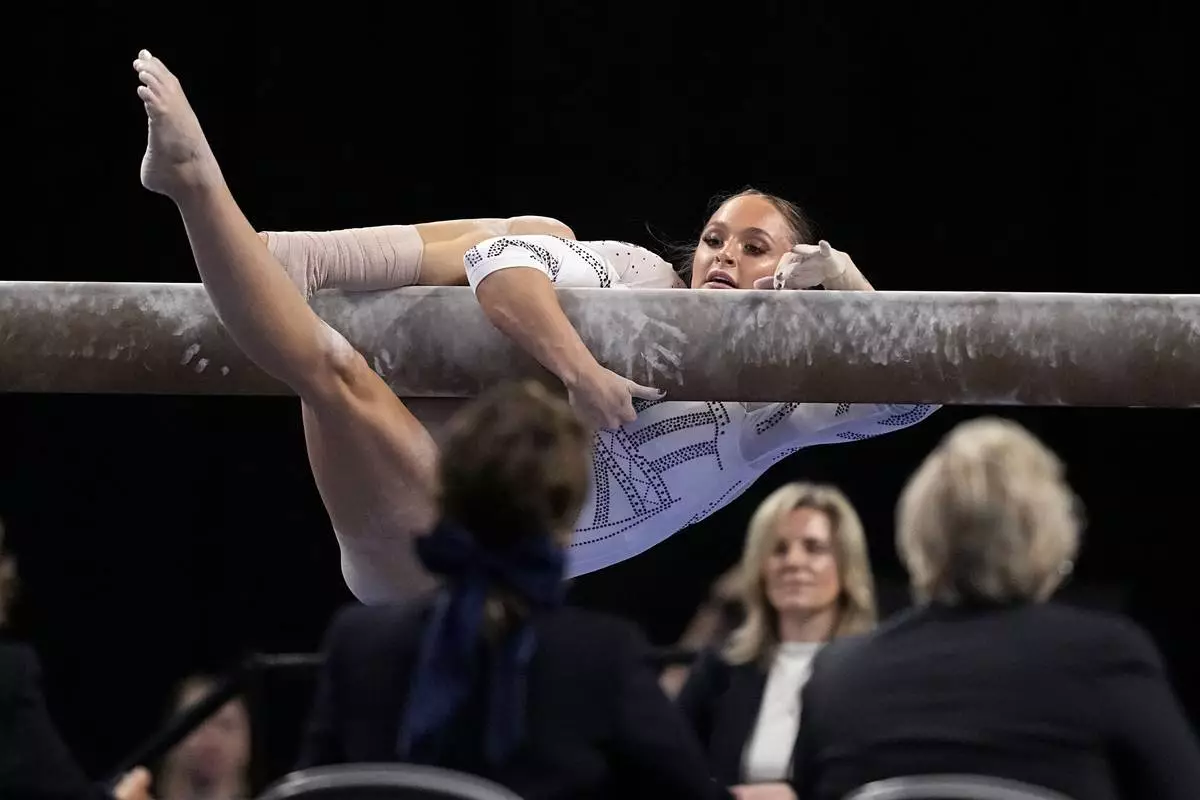
LSU's Savannah Schoenherr holds on to the beam without hitting the floor after losing her footing during her routine as judges look on during the NCAA women's gymnastics championships in Fort Worth, Texas, Saturday, April 20, 2024. (AP Photo/Tony Gutierrez)
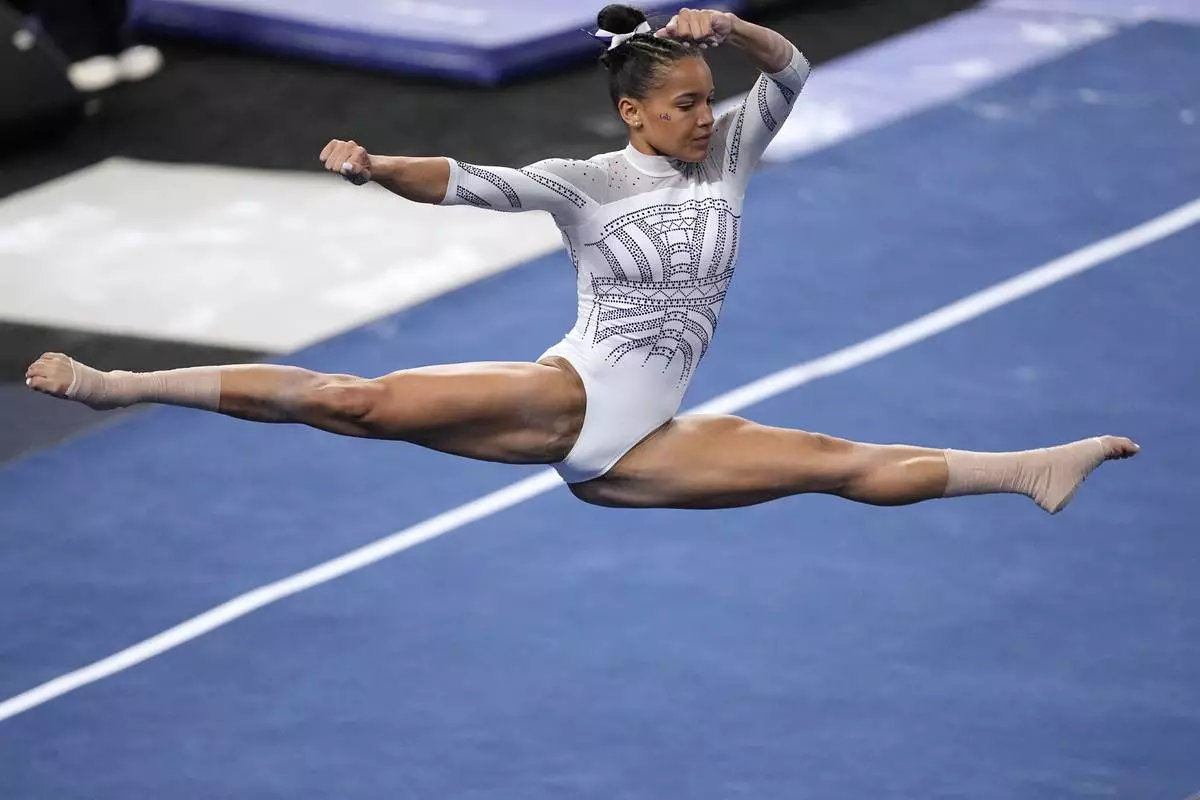
LSU's Haleigh Bryant competes in the floor exercise during the NCAA women's gymnastics championships in Fort Worth, Texas, Saturday, April 20, 2024. (AP Photo/Tony Gutierrez)
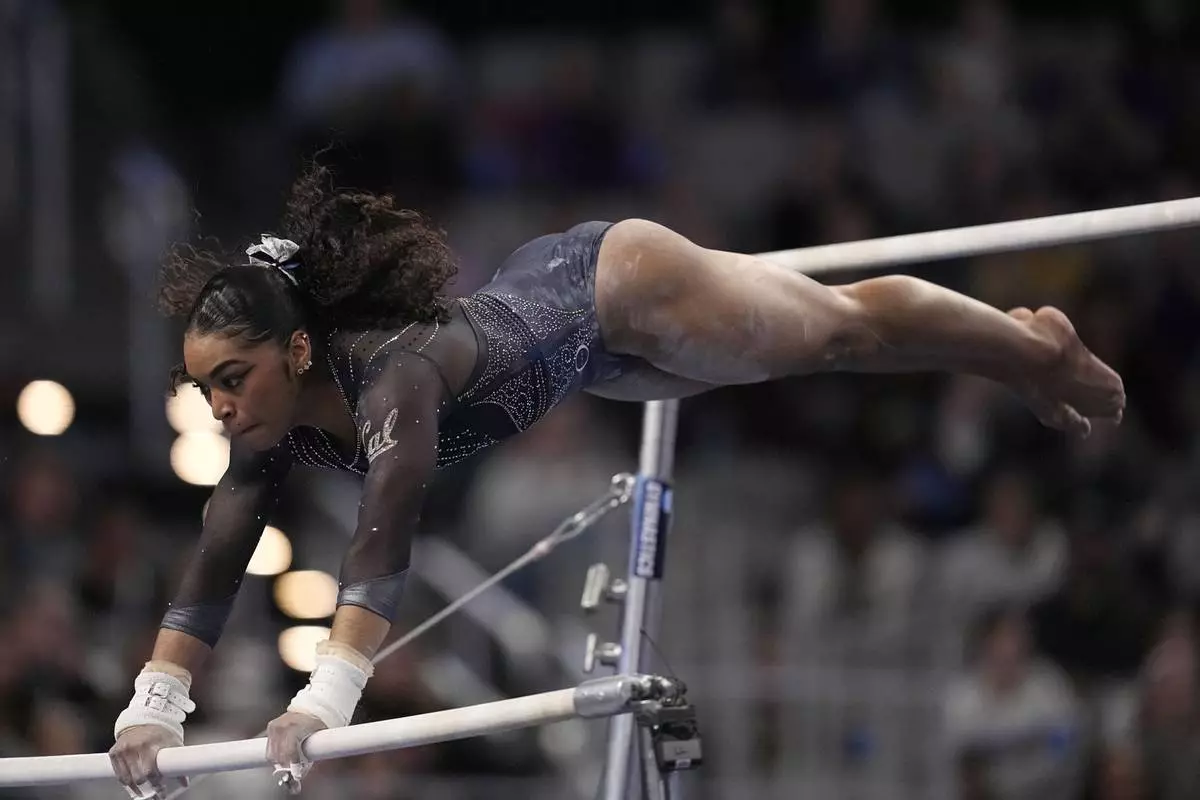
California's eMjae Frazier competes on the uneven bars during the NCAA women's gymnastics championships in Fort Worth, Texas, Saturday, April 20, 2024. (AP Photo/Tony Gutierrez)
WASHINGTON (AP) — A judge challenging the outcome of his North Carolina Supreme Court race was photographed wearing Confederate military garb and posing before a Confederate battle flag when he was a member of a college fraternity that glorified the pre-Civil War South.
The emergence of the photographs comes at a delicate time for Jefferson Griffin, a Republican appellate judge who is seeking a spot on North Carolina's highest court. Griffin, 44, is facing mounting criticism – including from some Republicans – as he seeks to invalidate over 60,000 votes cast in last November’s election, a still undecided contest in which he is trailing the Democratic incumbent by over 700 votes.
The photographs, which were obtained by The Associated Press, are from when Griffin was a student at the University of North Carolina at Chapel Hill from 1999-2003 and a member of the Kappa Alpha Order, one of the oldest and largest fraternities in the U.S., with tens of thousands of alumni.
Griffin said he regretted donning the Confederate uniform, which was customary during the fraternity's annual “Old South” ball.
“I attended a college fraternity event that, in hindsight, was inappropriate and does not reflect the person I am today,” Griffin said in a statement. “At that time, like many college students, I did not fully grasp such participation’s broader historical and social implications. Since then, I have grown, learned, and dedicated myself to values that promote unity, inclusivity, and respect for all people.”
One of the pictures, taken during the 2001 ball, shows Griffin and roughly two-dozen other fraternity members clad in Confederate uniforms. Another photograph from the spring of 2000 shows Griffin and other Kappa Alpha brothers in front of a large Confederate flag. He served in 2002 as his chapter’s president.
Kappa Alpha has proven to be a lightning rod for controversy over the decades, often due to the racist or insensitive actions of some of its members. A number of politicians have been forced to apologize for having worn Confederate costumes at the fraternity's functions or for being photographed in front of a Confederate flag.
Griffin said Friday he voted in favor of a resolution prohibiting Kappa Alpha members from displaying the rebel battle flag at the group’s national convention in 2001. The fraternity didn’t ban the wearing of the Confederate uniforms until nearly a decade later, long after Griffin graduated.
“We believe in cultural humility, we respect the best parts of our organization’s history, and through education we challenge our members to work for a better future. These things are not mutually exclusive,” said Jesse Lyons, a spokesman for Kappa Alpha’s national office in Lexington, Virginia.
The fraternity claims Robert E. Lee as its “spiritual founder” and long championed the Southern “Lost Cause," a revisionist view of history that romanticizes the Confederacy and portrays the Civil War as a valiant struggle for “states’ rights” unrelated to the enslavement of Black people. In decades past, some Kappa Alpha chapters referred to themselves as a “klan,” a term that many viewed as an unsubtle wink to the Ku Klux Klan.
The photographs featuring Griffin were taken at a time when many other Kappa Alpha chapters were reevaluating their celebration of the Confederacy.
During Griffin’s time in the fraternity, some in his chapter questioned the appropriateness of dressing up in Confederate uniforms for the ball. Griffin opposed abandoning the tradition, according to a person familiar with the situation, who spoke on the condition of anonymity out of fear of reprisal. The uniforms stayed.
Griffin said he would “not respond to unsubstantiated comments based on memories of 20-plus years past.”
In high school Griffin also expressed an affinity for Robert E. Lee, the Confederate general who led southern forces during the Civil War. In a 1998 feature on high school “scholars of the week” in The News & Observer of Raleigh newspaper, Griffin said Lee was his No. 1 choice to include on an “ideal guest list” for a party.
The Kappa Alpha Order was founded in 1865, not long after Lee surrendered to the Union Army, at a Virginia college where Lee served as president. At least one of the first members was a former rebel soldier who had served under Lee, who is revered by the fraternity as the ideal of gentlemanly Southern chivalry.
For more than a century, Kappa Alpha threw “Old South” parties. They were formal affairs where the Confederate battle flag was flown and fraternity brothers dressed in replica Confederate gray uniforms and their dates wore antebellum-style hoop skirts. Sometimes they would ride through campus on horseback.
Some Kappa Alpha chapters, particularly in the South, clung to their traditions, including the wearing of blackface, even as they drew protests and public sentiment shifted.
A Kappa Alpha “Old South” parade at Alabama’s Auburn University in 1992 drew supporters waving Confederate battle flags, as well as counter protesters who burned them. In 1995, a group of Kappa Alpha members at the University of Memphis hurled racial slurs while beating a Black student who caused a disturbance outside a frat party, the Memphis Commercial Appeal reported at the time.
The University of North Carolina at Chapel Hill was no exception to the turmoil. Under pressure from student groups, the school's Kappa Alpha chapter in 1985 canceled its annual “Sharecropper’s Ball," which some attended in blackface. Fraternity members said blackface was worn because the event needed both Black and white attendees, but promised to discontinue the practice, according to a news story in the Daily Tar Heel student newspaper.
The Kappa Alpha chapter at North Carolina’s Wake Forest University stopped allowing members to wear Confederate uniform and display the Confederate flag in 1987.
But other chapters held on longer. It wasn't until Kappa Alpha members at the University of Alabama wore Confederate uniforms during a parade that paused in front of a Black sorority, which elicited intense blowback, that the national headquarters forbade them. It’s unclear if the chapter at UNC banned the uniforms before the national organization did.
Griffin is not the first public official to draw unwanted attention for their college-age embrace of symbols drawn from the darker chapters of the South's past.
Virginia's then-governor, Democrat Ralph Northam, came under intense criticism in 2019 over a racist photo that appeared on his yearbook page of his medical school. The incident led reporters to scour the college histories of other Southern leaders, forcing a number of politicians to publicly address their time as Kappa Alpha brothers.
Mississippi Gov. Tate Reeves, then the state’s Republican lieutenant governor, dodged questions in 2019 about photos showing him wearing a Confederate uniform while he was a Kappa Alpha member at Millsaps College in the early 1990s. While Reeves was enrolled there in October 1994, other members of the fraternity were disciplined for wearing afro wigs and Confederate battle flags and shouting racial slurs at Black students, the AP reported at the time.
Republican South Carolina Gov. Henry McMaster declined to comment after yearbooks listed him as the leader of the fraternity's chapter at the University of South Carolina in 1969, along with photos of members wearing Confederate uniforms and posing with a rebel flag.
And Tennessee Gov. Bill Lee, also a Republican, expressed regret for participating in “Old South” parties as a student at Auburn University in the 1970s.
Contact AP’s global investigative team at Investigative@ap.org or https://www.ap.org/tips/
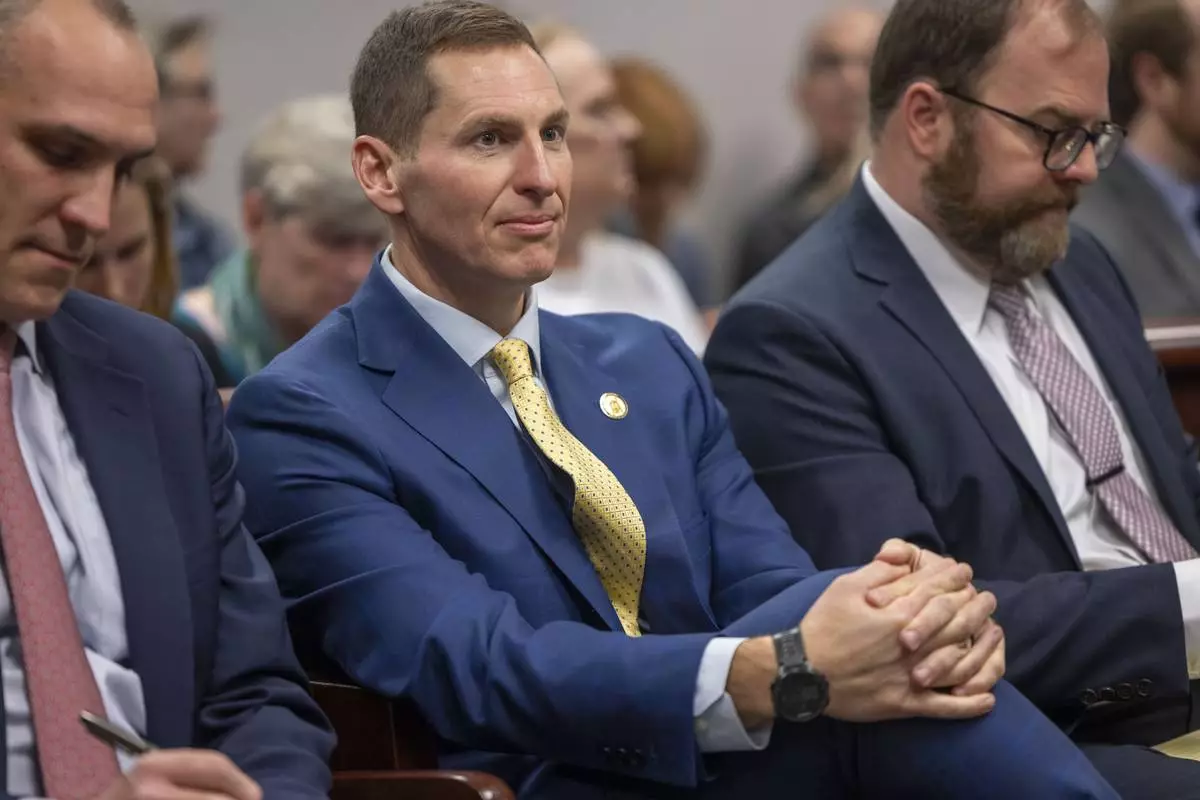
FILE - Judge Jefferson Griffin, the Republican candidate for the N.C. Supreme Court listens to testimony in Wake County Superior Court on Friday, February 7, 2025 in Raleigh, N.C. (Robert Willett/The News & Observer via AP, File)





